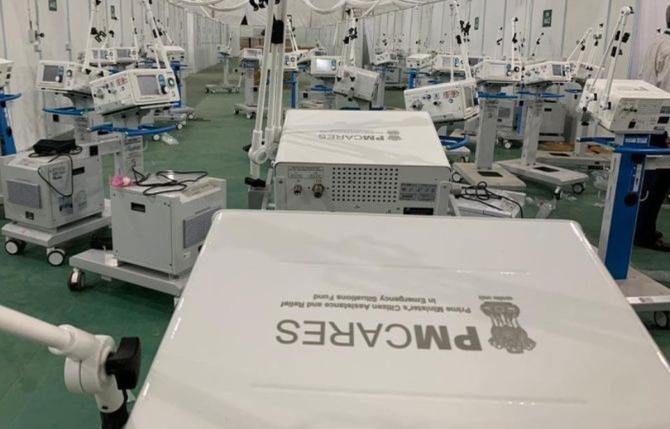 | « Back to article | Print this article |
The Supreme Court on Tuesday refused to direct the Centre to transfer the contributions made to the PM CARES Fund for battling the COVID-19 pandemic to the National Disaster Response Fund saying both are entirely different funds with separate object and purpose.

A bench headed by Justice Ashok Bhushan also said there is no statutory prohibition for the Centre utilising the NDRF for providing assistance in the fight of COVID-19 in accordance with the guidelines issued for administration of the NDRF.
"At this need of the hour no exception can be taken to the constitution of a public charitable trust, namely, PM CARES Fund to have necessary financial resources to meet the emergent situation," said the apex court which also rejected the submissions of the NGO, 'Centre for Public Interest Litigation', that there was no sufficient plan to deal with the COVID19 pandemic.
The top court said there is also no statutory prohibition in making any contribution by any person or institution in the NDRF as per Section 46(1)(b) of the Disaster Management Act, Act, 2005.
The contribution by any person or by any institution in PM CARES Fund is voluntary and it is open for any person or institution to make a contribution to the PM CARES Fund, the top court said.
"The funds collected in the PM CARES Fund are entirely different funds which are funds of a public charitable trust and there is no occasion for issuing any direction to transfer the said funds to the NDRF.
"The prayer of the petitioner to direct all the funds collected in the PM CARES Fund till date to be transferred to the NDRF is refused," the bench, also comprising Justices R S Reddy and M R Shah, said.
It said when the Central government is providing financial assistance to the States to contain COVID-19 it is not for any PIL petitioner to say that Centre should give amount from this fund or that fund.
"The financial planning is in the domain of the Central government, which financial planning is made after due deliberation and consideration. We, thus, do not find any substance in the submission of the petitioner that there is any statutory restriction/prohibition in utilization of NDRF for COVID-19," the apex court said in its 75- page verdict.
The NGO, Centre for Public Interest Litigation, had sought a direction that all the money collected under the PM CARES Fund for the COVID-19 pandemic should be transferred to the NDRF.
The PIL had also sought a direction to the government to prepare, notify and implement a national plan under the Disaster Management Act to deal with the COVID-19 pandemic.
The apex court said the National Disaster Management Plan prepared by the Centre deals with all aspects of the Biological and Public Health Emergencies in systematic and planned manner and thus there is no need of separate plan to deal with COVID-19 pandemic.
The bench said the National Disaster Management Authority was well aware of the epidemics and had issued guidelines in the year 2008 itself which has been further detailed in Plan-2019.
"All aspects of the epidemics, all measures to contain an epidemic, preparedness, response, mitigation have been elaborately dealt in Plan, 2019. Unless the National Plan as contemplated under Section 11 contains all aspects of disaster including the Biological and Public Health Emergencies, it will not be possible for the governments to immediately respond and contain an epidemic," it said.
The apex court said the Disaster Management Act, 2005, contain ample powers and measures, which can be taken by the National Disaster Management Authority, National Executive Committee and Central Government to prepare further plans, guidelines and Standard Operating Procedure (SOPs), which in respect to COVID-19 have been done from time to time.
"The petitioners are not right in their submissions that there is no sufficient plan to deal with COVID19 pandemic.
"COVID-19 being a Biological and Public Health Emergency, which has been specifically covered by National Plan, 2019, which is supplemented by various plans, guidelines and measures, there is no lack or dearth of plans and procedures to deal with COVID-19," the bench said.
On the issue of laying down the minimum standards of relief to affected persons, the top court held that uniform guidelines are contemplated so that victims affected by disaster are provided with minimum requirement in the relief camps in respect of shelter, food, drinking water, medical cover and sanitation and other reliefs.
"There being already guidelines for minimum standards in place even before COVID-19, the said guidelines for minimum standards holds good even for those who are affected by COVID-19.
"The prayer of the petitioner to direct the Union of India to issue fresh guidelines under Section 12 to be provided to persons infected with COVID-19 is misconceived," the bench said.